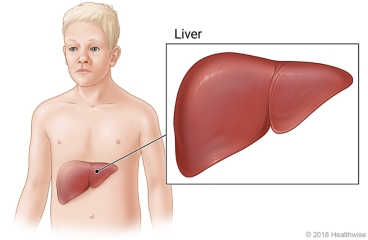
What is a liver transplant?
A liver transplant is surgery to give your child a healthy liver from another person. Your child may get a whole new liver or just part of a new liver. Your child could get part of a liver from someone you know or from another living donor. Or your child could get a whole liver from someone who has died. The wait for a new liver varies but depends on how sick your child is. During that time, your doctor will update the transplant team about your child's condition. When you get a call from the transplant team, you'll need to bring your child to the hospital right away.
To do the surgery, the doctor makes a cut (incision) in your child's upper belly. Then the doctor removes the liver. Next, the doctor connects the blood vessels of the new liver to your child's blood vessels. The doctor also connects the bile duct of the new liver to your child's bile duct.
After surgery, the new liver will start to do the work that your child's old liver could not.
Your child will probably spend at least a couple of weeks in the hospital. Your child will go back for frequent checkups for about a month after that. Most children are able to go back to school in about 3 months. Your transplant team will give you a follow-up schedule.
How do you prepare for surgery?
Surgery can be stressful for both your child and you. This information will help you understand what you can expect. And it will help you safely prepare for your child's surgery.
 Preparing for surgery
Preparing for surgery
- Follow the transplant team's instructions about giving your child healthy foods while your child is on the waiting list. Good nutrition can help make the surgery more successful.
- Make sure your child takes all medicines as instructed by the doctor.
- Go to all medical appointments so your child's doctor can monitor your child's health.
- Keep a bag packed for you and your child so you'll be ready to go to the hospital when a liver becomes available.
- Understand exactly what surgery is planned, along with the risks, benefits, and other options.
What happens on the day of surgery?
- Follow the instructions exactly about when your child should stop eating and drinking. If your doctor told you to have your child take any medicines on the day of surgery, have your child take them with only a sip of water.
- Have your child take a bath or shower before they come in for surgery. Do not apply lotions, perfumes, deodorants, or nail polish.
- Do not let your child wear contact lenses. Bring your child's glasses or contact lens case.
- Be sure your child has something that's a reminder of home. A special stuffed animal, toy, or blanket may be comforting. For an older child, it might be a book or music.
At the hospital or transplant center
- A parent or legal guardian must accompany your child.
- When you arrive at the hospital or transplant center, your child will be prepared for surgery right away. Final tests will be done to make sure that your child is ready and that the donor organ will likely work for your child.
- Your child will be kept comfortable and safe by the anesthesia provider. Your child will be asleep during the surgery.
- The surgery will take several hours.
- After surgery, your child will stay in the pediatric intensive care unit (PICU) for 2 to 3 days or more. The amount of time will depend on your child's condition. The staff will watch your child's condition. The doctor will talk to you about the surgery.
- A ventilator may be needed to help your child breathe after the surgery.
When should you call your doctor?
- You have questions or concerns.
- You don't understand how to prepare your child for surgery.
- Your child becomes ill before the surgery (such as fever, flu, or a cold).
- You need to reschedule or have changed your mind about your child having the surgery.
Where can you learn more?
Go to http://www.healthwise.net/patientEd
Enter L370 in the search box to learn more about "Liver Transplant: Before Your Child's Surgery".
Current as of: October 19, 2024
Author: Ignite Healthwise, LLC Staff
Clinical Review Board
All Ignite Healthwise, LLC education is reviewed by a team that includes physicians, nurses, advanced practitioners, registered dieticians, and other healthcare professionals.

